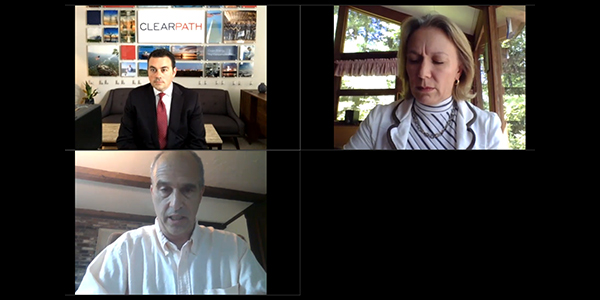Nuclear Energy Institute CEO Maria Korsnick is always upbeat and optimistic about the future of nuclear energy when she makes her annual State of the Industry address, emphasizing plants’ emissions-free nature, high capacity factors and reliability.
Korsnick’s address this year, conducted online as it has been for the last two years, was no different. (See NEI CEO: FirstEnergy Emergency Request a ‘Bridging Strategy’.) But after the usual quick, bright and positive speech and soft question-and-answer with NEI spokeswoman Monica Trauzzi, NEI on Wednesday hosted a panel discussion featuring Union of Concerned Scientists President Ken Kimmell and Renewable Energy Buyers Alliance (REBA) CEO Miranda Ballentine. Both expressed general support for nuclear’s role in a future, zero-carbon generation mix, though both couched it with contingencies.
In her opening speech, Korsnick positioned nuclear not as a competitor with renewables but as a partner. Though she noted that nuclear provides more than half of all carbon-free generation in the U.S. (as she did last year), “I want to be absolutely clear: We need to develop every source of carbon-free energy that we can. The world is counting on carbon-free resources to complement one another, not just compete. Our choice isn’t between nuclear power or wind and solar. It’s between a status quo of rising emissions from fossil fuels or a low-carbon future from all available sources, including nuclear.”
As evidenced by its name, REBA members — consisting of large corporations such as Facebook, Google and Walmart — have focused their procurement targets on renewable resources, particularly utility-scale wind and solar. But Ballentine said that “there has been a fairly significant transformation in the mindset of large clean-energy buyers, actually quite recently I would say … from goals of 100% renewable energy, to now companies thinking about 24/7/365 zero-carbon power, where renewable energy is one means to that end.”
REBA members “are beginning to think about other forms of zero-carbon power” besides large wind and solar projects, Ballentine continued. She listed geothermal, landfill gas and hydropower, “which is the one that tends to get left out of the discussions so frequently.”
But she said nuclear presents unique concerns for the organization: “What do we do with the waste, how do we handle proliferation, and how do we handle safety? … To the extent that new nuclear [technology] addresses some of those three core challenges of the existing fleet … I think you’re going to start seeing large consumers of power being more interested in the potential role that new nuclear can play.”
Kimmell emphasized “the herculean challenge” of not only using 100% clean energy but electrifying transportation and building heating. “This is a gigantic challenge that implies a pace of expansion of our electric grid in a way that we’ve never come close to doing in history,” he said.
Ballentine agreed. “I would say that many of the members in REBA … have a sense of urgency around the timeline that even 2050 for the power system is too late because there are so many other parts of our economy that are much harder to decarbonize.”
“To meet a challenge like” avoiding permanent climate change, Kimmell said, “all of us need to be prepared to abandon a tribalistic attachment to particular solutions.”
ClearPath Executive Director Rich Powell, who moderated the panel, echoed those sentiments. “I think that lesson of stopping being against the things we’re not specifically for — and eventually becoming for the things we’re not specifically for — is … just a crucial mental frame to adjust [to] as we respond to a challenge this enormous.” ClearPath, formed in 2014, seeks to “develop and advance conservative policies that accelerate clean energy innovation.”
Kimmell warned, however, that UCS’ support for nuclear power was conditioned on maintaining the Nuclear Regulatory Commission’s strict safety regulations for plants. “And I should say this is an area where it’s hard for us to work cooperatively because we don’t support efforts to relax those standards, and to the extent that those standards do get relaxed, we’re going to need to reconsider that criteria” of support, he said.
He also said any financial support through legislation should be reserved for plants that “meet or exceed the NRC’s highest safety standards.” He pointed to UCS’ 2018 report that recommended policies such as a national carbon tax or clean energy standard that would prevent existing nuclear plants from retiring earlier than their expected useful life.







